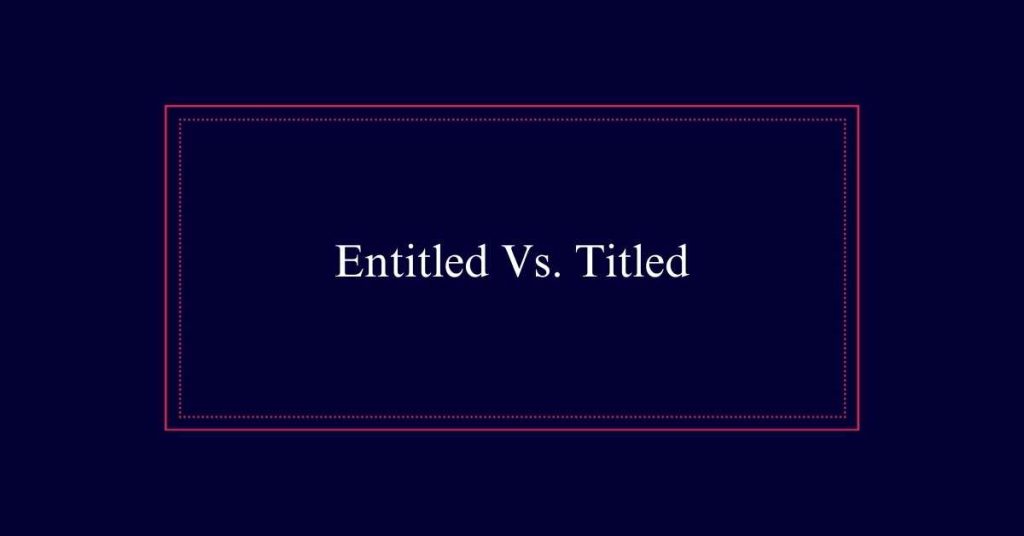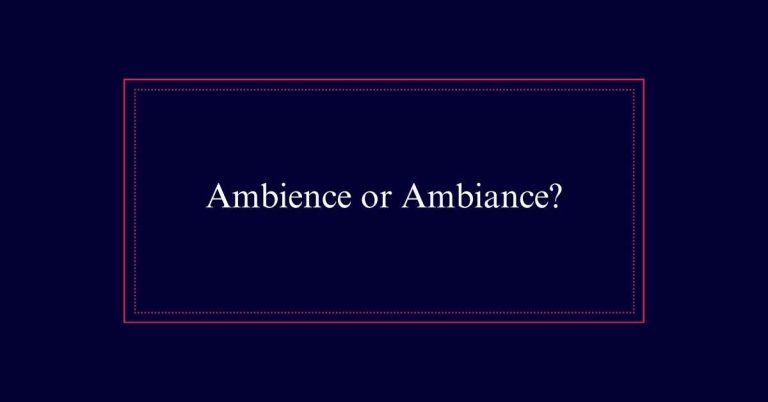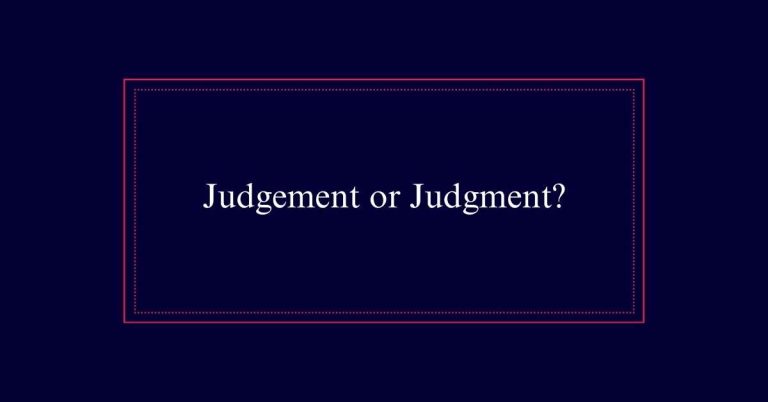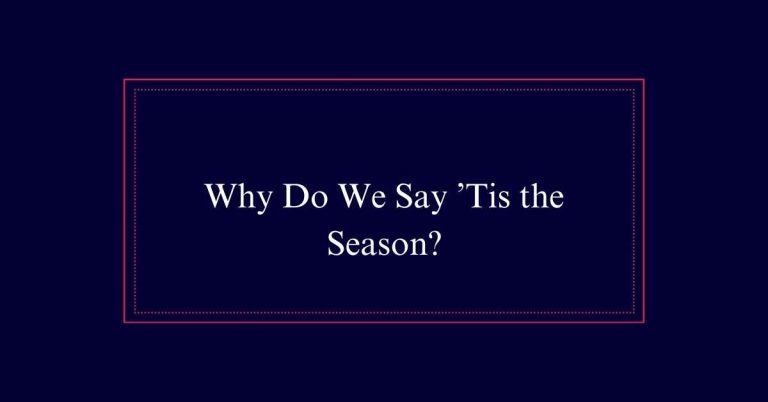Entitled Vs. Titled
The terms ‘entitled’ and ‘titled’ have distinct uses. ‘Titled’ generally refers to naming a book, song, or other creative work. For example, ‘Her memoir is titled ‘Journey Through Life’.’ ‘Entitled’ has two primary meanings: naming something or granting rights. For instance, ‘You are entitled to four weeks of vacation.’ Nonetheless, ‘entitled’ often carries negative connotations when describing someone acting as if they deserve special treatment. Understanding these differences helps guarantee clear communication.
Title as Noun and Verb
The word ‘title’ functions both as a noun and a verb, each with distinct applications.
As a noun, it refers to the name of a book, song, or other creative work. For example, a novel’s title helps readers identify and distinguish it from others.
As a verb, ‘title’ means to give a name to something. An author titles their book to convey its essence and attract readers.
Additionally, ‘title’ can denote a rank or status, such as among ‘titled aristocrats,’ indicating individuals with noble lineage. The adjective form, ‘titled,’ is often used under these circumstances.
Understanding these usages helps in effective communication, ensuring clarity when naming or describing creative works and social ranks.
Examples of ‘Titled’
Examples of ‘titled’ can be found in both creative works and social hierarchies. In literature, music, and film, ‘titled’ refers to naming works, such as Odom’s self-titled jazz album or the book ‘A Book About Love.’ In social contexts, it denotes individuals with ranks or noble statuses, like titled chiefs or lords.
| Category | Example | Description |
|---|---|---|
| Literature | ‘A Book About Love’ | A named book by Jonah Lehrer |
| Music | Odom’s self-titled album | An album bearing the artist’s name |
| Nobility | Titled Chiefs | Chiefs with conferred social ranks |
These examples demonstrate the varied applications of ‘titled’ in naming and status contexts.
Usage of ‘Entitle’
‘Entitle’ often sparks debate due to its dual meanings and varied applications.
First, it can mean giving a name to a book or other work, as seen in titles like ‘Stand Up China 2017’ and ‘ZIKA: The Emerging Epidemic.’
Second, it signifies granting a right or privilege. For example, employees are entitled to minimum wages by law. This dual usage can lead to confusion.
Additionally, the adjective form, ‘entitled,’ often carries negative connotations, implying an unwarranted sense of privilege.

Understanding the context is important when using ‘entitle.’ Awareness of its meanings ensures precise communication.
In some cases, opting for ‘title’ instead can avoid potential misunderstandings and negative associations.
Controversial ‘Entitle’ Cases
Controversial cases of using ‘entitle’ arise when its dual meanings create confusion and misinterpretation. For example, the book ‘Stand Up China 2017’ was said to be ‘entitled’ by some, sparking debates on the proper use of the verb.
Similarly, the phrase ‘entitled to minimum wages’ versus ‘titled as a bestseller’ demonstrates the ambiguity. The term ‘entitle’ can mean both giving a name and granting a right. This duality often leads to misunderstandings, particularly in legal and literary contexts.
Critics argue that the negative connotations associated with the adjective ‘entitled’ further complicate its use. To avoid confusion, it is often recommended to use ‘title’ when referring to naming and reserve ‘entitle’ for rights and privileges.
Dual Meanings of ‘Entitle’
The confusion surrounding the use of ‘entitle’ stems from its dual meanings of giving a name and granting a right. This duality creates ambiguity in various contexts. Understanding its distinct applications is important for clear communication.
- Naming: ‘Entitle’ can mean giving a name to something, such as a book or a project. For example, ‘The book was entitled ‘Modern Science”.
- Rights and Privileges: It also means granting a right or privilege. For instance, ‘Employees are entitled to a lunch break’.
- Perceived Privilege: The term ‘entitled’ can describe individuals who believe they deserve special treatment without earning it, leading to negative connotations.
Recognizing these differences helps in using ‘entitle’ appropriately.
Challenges With ‘Entitle’
Addressing the challenges associated with ‘entitle’ requires careful consideration of its multiple meanings and connotations. The term can mean both giving a name and granting a right. This duality often creates confusion.
For example, using ‘entitle’ to name a book can be misinterpreted as granting a right. Additionally, the adjective ‘entitled’ often carries negative connotations, implying a sense of unwarranted privilege. These complexities make ‘entitle’ a contentious choice in many contexts.
To avoid misunderstandings, it may be more effective to use ‘title’ when referring to naming. This helps maintain clarity and reduces the potential for negative associations. Understanding these challenges is essential for precise and effective communication.
Perception and Clarity
Given the complexities surrounding the use of ‘entitle,’ understanding how it influences perception and clarity in communication becomes crucial. The dual meanings of ‘entitle’—to name something and to grant a right—can create confusion. This ambiguity affects how messages are received and understood. Misinterpretations can arise, leading to unclear communication.
To maintain clarity, consider these points:
- Context: Always evaluate the context to determine the most appropriate term.
- Precision: Use ‘title’ when referring to giving a name, and reserve ‘entitle’ for granting rights or privileges.
- Perception: Be aware that ‘entitled’ carries negative connotations, which can influence how the message is perceived.
These strategies help uphold clear and effective communication.
Implications and Recommendations
Given the intricacies surrounding ‘entitle,’ it is crucial to understand its implications for effective communication.
The dual meanings of ‘entitle’—to name something and to grant rights—can lead to confusion. This ambiguity affects clarity, particularly in formal writing. It is vital to take into account context when choosing between ‘entitle’ and ‘title.’ Using ‘title’ for naming can often prevent misunderstandings.
Additionally, the adjective ‘entitled’ has negative connotations linked to perceived privilege. Awareness of these factors can enhance precision in language use.
To improve communication, it is advisable to use ‘title’ for naming purposes and reserve ‘entitle’ for contexts involving rights or privileges. This approach can mitigate confusion and ensure clear, effective communication.
Frequently Asked Questions
How Does ‘Entitle’ Differ From ‘Authorize’ in Legal Contexts?
In legal contexts, ‘entitle’ refers to granting a right or claim, whereas ‘authorize’ means giving official permission or power to act. ‘Entitle’ relates to rights, while ‘authorize’ pertains to permissions and actions.
Are There Historical Origins That Explain the Dual Meanings of ‘Entitle’?
The dual meanings of ‘entitle’ stem from its Latin root ‘intitulare,’ meaning to give a name or a right. Over time, its usage evolved, creating the dual meanings we recognize in modern language.
How Do Other Languages Handle the Distinction Between ‘Title’ and ‘Entitle’?
In many languages, distinct words express the concepts of “title” and “entitle.” For example, in French, “titre” means title, while “intituler” means to entitle. Such linguistic clarity helps avoid confusion between naming and granting rights.
Can ‘Entitled’ Be Used in a Positive Sense?
Yes, “entitled” can be used positively. It refers to granting a right or privilege, such as being entitled to benefits or rewards. This usage highlights fairness and recognition, making it a positive term in those contexts.
What Are Some Common Synonyms for ‘Entitle’ to Avoid Confusion?
Common synonyms for ‘entitle’ include ‘authorize,’ ‘grant,’ ‘give rights to,’ ‘allow,’ and ‘qualify.‘ Using these alternatives can help prevent confusion and guarantee clarity in communication, particularly when discussing rights or privileges.






